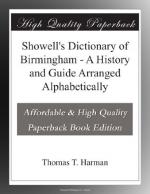Birmingham in the Time of the Edwards and Harrys.—The Manor passed from the Bermingham family in 1537, through the knavish trickery of Lord L’Isle, to whom it was granted in 1545. The fraud, however, was not of much service to the noble rascal, as he was beheaded for treason in 1553. In 1555 the Manor was given by Queen Mary to Thomas Marrow, of Berkswell.
Birmingham in 1538.—Leland, who visited here about this date, says in his “Itinerary”—“There be many smithies in the towne that use to make knives and all manner of cutlery tooles, and many lorimers that make bittes, and a great many naylors, so that a great part of the towne is maintained by smithes, who have their iron and seacole out of Staffordshire.” He describes the town as consisting of one street, about a quarter of a mile long, “a pretty street or ever I enterd,” and “this street, as I remember, is called Dirtey.”
Birmingham in 1586.—Camden in his “Britannica,” published this year, speaks of “Bremicham, swarming with inhabitants, and echoing with the noise of anvils, for the most part of them are smiths.”
Birmingham in 1627.—In a book issued at Oxford this year mention is made of “Bremincham inhabited with blacksmiths, and forging sundry kinds of iron utensils.”
Birmingham in 1635.—As showing the status the town held at this date we find that it was assessed for “ship money” by Charles I. at L100, the same as Warwick, while Sutton Coldfield had to find L80 and Coventry L266.
Birmingham in 1656.—Dugdale speaks of it as “being a place very eminent for most commodities made of iron.”
Birmingham in 1680-90.—Macaulay says: The population of Birmingham was only 4,000, and at that day nobody had heard of Birmingham guns. He also says there was not a single regular shop where a Bible or almanack could be bought; on market days a bookseller named Michael Johnson (father of the great Samuel Johnson) came over from Lichfield and opened a stall for a few hours, and this supply was equal to the demand. The gun trade, however, was introduced here very soon after, for there is still in existence a warrant from the Office of Ordnance to “pay to John Smart for Thomas Hadley and the rest of the Gunmakers of Birmingham, one debenture of ffour-score and sixteen poundes and eighteen shillings, dated ye 14th of July, 1690.”—Alexander Missen, visiting this town in his travels, said that “swords, heads of canes, snuff-boxes, and other fine works of steel,” could be had, “cheaper and better here than even in famed Milan.”
Birmingham in 1691.—The author of “The New State of England,” published this year, says: “Bromichan drives a good trade in iron and steel wares, saddles and bridles, which find good vent at London, Ireland, and other parts.” By another writer, “Bromicham” is described as “a large and well-built town, very populous, much resorted to, and particularly noted a few years ago for the counterfeit groats made here, and dispersed all oven the kingdom.”




